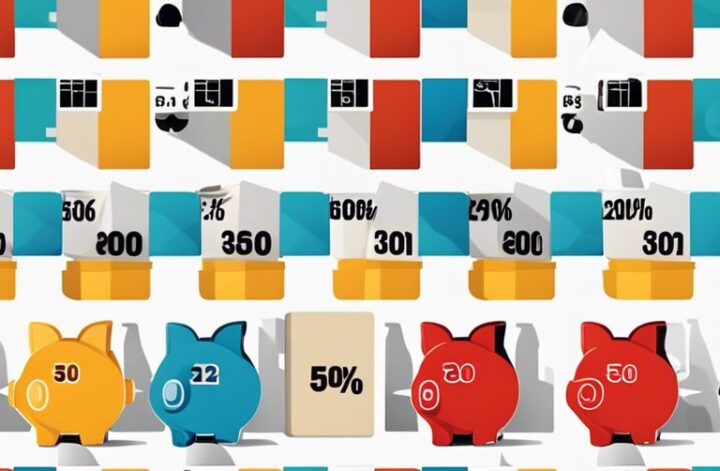Monthly budgeting and annual budgeting are two popular methods that individuals can use to manage their finances effectively. Both approaches have their own sets of advantages and disadvantages, catering to different lifestyles and financial goals. Understanding the pros and cons of each method can help young professionals determine which approach best suits their needs and preferences. Let’s explore the features of monthly and annual budgeting to help you find your rhythm in managing your finances.

Understanding Monthly Budgeting
The Basics of Monthly Budgeting
To effectively manage your finances, it is necessary to break down your expenses and income on a monthly basis. This approach allows you to track your spending habits more closely and make necessary adjustments throughout the month.
Advantages of Monthly Budgeting
Budgeting on a monthly basis provides a real-time snapshot of your financial situation. It allows you to stay on top of your financial goals and make informed decisions about your spending. According to a recent survey, 67% of individuals who budget monthly find it easier to identify areas where they can cut back on expenses.
Monthly budgeting also helps in planning for irregular expenses such as birthdays or holidays. By allocating funds each month, you can avoid the stress of unexpected financial obligations.
Disadvantages of Monthly Budgeting
One of the challenges of monthly budgeting is dealing with the variability of expenses. Some months may have higher costs than others, leading to difficulty in sticking to a fixed budget. Additionally, unexpected expenses can disrupt your monthly plan, making it harder to stay within your financial limits.
While monthly budgeting provides a detailed insight into your financial habits, it may require more frequent adjustments compared to annual budgeting. This can be time-consuming and overwhelming for some individuals.
Exploring Annual Budgeting
Now, when it comes to budgeting on an annual basis, it offers a different approach compared to monthly budgeting. For those looking to manage their finances through an annual lens, it’s important to understand the differences and benefits. To dive deeper into this topic, check out this article on Annual vs Monthly Billing: Subscription Payment.
The Mechanics of Annual Budgeting
Annual budgeting involves setting financial goals and allocating resources for the entire year in one go. This method requires forecasting expenses, income, and savings over the course of 12 months, providing a comprehensive overview of your financial health.
Advantages of Annual Budgeting
One significant advantage of annual budgeting is the ability to plan for long-term financial goals. By mapping out your finances for the entire year, you can identify opportunities for saving, investing, and prioritizing expenses in a strategic manner.
Another benefit of annual budgeting is the potential for cost savings. By paying for certain services or subscriptions on an annual basis, you may be able to unlock discounts or avoid monthly fees, resulting in overall savings over time.
Disadvantages of Annual Budgeting
Annual budgeting may pose challenges for individuals who prefer more frequent check-ins on their finances. Since the budget is set for the entire year, there is less room for adjustment or flexibility in case of unexpected expenses or income changes.
Expenses that fluctuate throughout the year, such as seasonal bills or irregular purchases, can be harder to manage with an annual budget. It requires careful planning and monitoring to ensure that you stay on track with your financial goals without feeling constrained by the annual budgeting framework.

Blending the Approaches
Integrating Monthly and Annual Budgets
Unlike the strict confines of either monthly or annual budgeting, some individuals find success in blending these methods to create a more flexible and comprehensive approach to managing their finances. By integrating both monthly and annual perspectives, young professionals can take advantage of the detailed tracking offered by monthly budgets while also benefiting from the long-term planning and goal setting inherent in annual budgets.
Strategies for Effective Hybrid Budgeting
On the path to achieving financial stability, individuals can adopt various strategies to effectively blend monthly and annual budgeting methods. One approach is to allocate a percentage of income towards monthly expenses while setting aside a portion for long-term goals such as saving for retirement or a major purchase. By incorporating both short-term and long-term financial objectives into their budgeting process, young professionals can strike a balance between meeting immediate needs and planning for the future.
To enhance the effectiveness of hybrid budgeting, individuals can utilize tools such as financial apps or spreadsheets to track their income, expenses, and savings goals. By regularly reviewing their financial progress and making adjustments as needed, young professionals can stay proactive and informed about their financial decisions, leading to greater overall financial well-being.
Hybrid budgeting offers a personalized approach that combines the best aspects of monthly and annual budgeting methods, allowing young professionals to tailor their financial planning to suit their unique lifestyle and goals.
Personal Lifestyle and Budgeting Fit
Assessing Your Financial Goals
Many young professionals find themselves at a crossroads when deciding between monthly and annual budgeting methods. It is crucial to assess your financial goals and priorities to determine which approach aligns best with your lifestyle and income flow. Monthly budgeting allows for more flexibility and short-term planning, ideal for those with variable incomes or who prefer to stay on top of their expenses on a regular basis. On the other hand, annual budgeting offers a broader perspective, enabling long-term goal setting and saving strategies, which may appeal to individuals with stable incomes and specific financial milestones in mind.
Aligning Budgeting Methods with Lifestyle Needs
Lifestyle plays a significant role in shaping the most suitable budgeting method for individuals. For those with busy and demanding schedules, monthly budgeting may be more practical as it requires frequent check-ins and adjustments to stay on track. On the contrary, individuals who prefer a more hands-off approach and prefer to set their budget once a year may find annual budgeting more convenient. Selecting a budgeting method that resonates with your lifestyle needs is key to creating a sustainable financial plan that you can stick to in the long run.
For young professionals juggling multiple responsibilities, finding the right balance between financial goals and lifestyle preferences is crucial. It is crucial to consider factors such as income stability, spending habits, and time availability when choosing between monthly and annual budgeting methods. By aligning your budgeting approach with your lifestyle needs, you can create a solid financial foundation that supports your values and long-term aspirations.
Financial
Understanding the nuances of monthly and annual budgeting methods can help young professionals make informed decisions about their financial management practices. While monthly budgeting offers a more granular view of expenses and income, annual budgeting allows for comprehensive planning and goal setting. By evaluating your financial objectives and lifestyle requirements, you can tailor your budgeting method to suit your individual needs and set yourself up for financial success in the future.
Technology and Budgeting
After setting up your budgeting plan, it’s crucial to track your expenses regularly to stay on top of your financial goals. If you’re unsure how to start, check out How to Track Expenses in Four Simple Steps for detailed guidance on monitoring your spending habits effectively.
How Budgeting Apps Can Simplify the Process
Technology plays a vital role in simplifying budgeting. Utilizing budgeting apps like Mint, YNAB (You Need a Budget), or EveryDollar can automate expense tracking, categorize transactions, and provide insightful reports. These tools eliminate the need for manual entry, saving you time and ensuring greater accuracy in managing your finances.
Selecting the Right Tools for Monthly and Annual Budgeting
On your quest to master budgeting, it’s necessary to select the right tools that align with your chosen budgeting method. Consider factors such as ease of use, customization options, synchronization with your financial accounts, and compatibility with your preferred budgeting frequency. By choosing tools that cater to your specific needs, you can streamline your budgeting process and make smarter financial decisions.

Common Pitfalls and How to Avoid Them
Pitfalls in Monthly Budgeting and Mitigation Strategies
To effectively budget on a monthly basis, it is crucial to account for irregular expenses that may not occur each month. Failure to plan for these can lead to overspending or dipping into savings unexpectedly. To mitigate this risk, set aside a portion of your budget for such expenses, creating a buffer for unforeseen costs. Additionally, frequent tracking and adjustment of your budget throughout the month can help you stay on top of your finances and make necessary changes as needed.
Pitfalls in Annual Budgeting and Prevention Techniques
Annual budgeting poses the risk of overlooking short-term fluctuations or changes in income or expenses. Failing to adapt to these changes can result in a budget that is no longer reflective of your financial reality. To prevent this, conduct regular reviews of your annual budget and make adjustments as necessary, especially in response to major life events or financial shifts. Consider setting aside a portion of your income as a contingency fund to cover unexpected costs that may arise throughout the year.
Monthly budgeting ensures you are constantly aware of your financial situation, making adjustments as needed. However, annual budgeting provides a broader perspective and allows for more long-term planning. By understanding the potential pitfalls of each method and implementing strategies to overcome them, young professionals can find a budgeting approach that aligns with their lifestyle and financial goals.
Final Words
Upon reflecting on the pros and cons of monthly and annual budgeting methods, it is evident that both approaches have their own benefits and drawbacks. Monthly budgeting provides a more detailed and immediate overview of your financial situation, allowing for greater flexibility and adjustment when needed. On the other hand, annual budgeting offers a broader perspective and long-term planning, enabling you to set and achieve larger financial goals over the course of a year.
Ultimately, the choice between monthly and annual budgeting methods depends on your personal preferences, lifestyle, and financial goals. Young professionals should consider factors such as their income frequency, spending habits, and ability to stick to a budget before deciding on the approach that best suits their needs. Whichever method you choose, remember that the key to successful budgeting lies in consistency, discipline, and regular monitoring of your finances to ensure financial stability and growth in the long run.
FAQ
Q: What are the key advantages of monthly budgeting?
A: Monthly budgeting allows for more frequent monitoring of expenses, making it easier to track your spending habits and adjust accordingly. It also provides a shorter time frame for setting goals and assessing financial progress.
Q: What are the main benefits of annual budgeting?
A: Annual budgeting offers a comprehensive view of your finances for the entire year, allowing for better long-term planning and goal-setting. It can help in identifying and preparing for major expenses that may occur throughout the year.
Q: How can young professionals determine which budgeting method suits their lifestyle?
A: Young professionals should consider their income stability, spending patterns, financial goals, and willingness to track expenses regularly. Those with fluctuating incomes or variable expenses may benefit from monthly budgeting, while those with consistent income and long-term financial goals may prefer annual budgeting.




